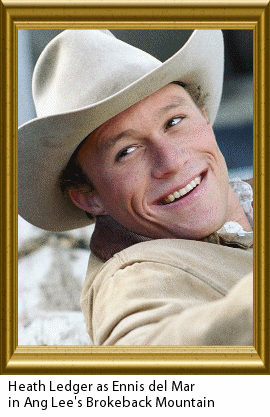A really classic sketch from the Daily Show on an inventor of a "GAYDAR device." You can see how young Stephen Colbert is in this one. I’m curious to see a follow up with this inventor. You know… just to see if there’ve been any big life changes since this was taped.
All posts by Dan Vera
Urban Wildlife – Bear in the Backyard
This is pretty funny. My favorite part might be the pillow rearranging.
Gore Speaks Out for Gay Marriage Rights
Al Gore comes out for Gay couples rights:
Ennis del Mar is dead – RIP Heath Ledger
The story is still breaking and the reasons or causes still unknown. I’m sure we’ll know more as the news media does it’s work of uncovering what can be uncovered.
My partner called me up to tell me the news. Feeling shocked I looked online while we talked to confirm what was true. Then I called Bo up and we talked about the loss. He told me the television stations in New York had broken in with the news.
Is this story right for a blog about Gay Wisdom?
Yes. I believe it is. Ledger wasn’t Gay but he was so successful in providing the film-watching world with one of the most nuanced, aching portrayals of a very real Gay man dealing with living openly and claiming his life — a portrayal we had never seen on the screen before on such a level. With that alone he may have singlehandedly (and with Jake Gyllenhall) provided a powerful service to the larger public about the realities of the homophobic, hetero-orthodoxy LGBT people live in day in and day out.
Beyond all the Brokeback jokes that flooded over us during the movie’s historic run and trophied success, there remained that simple story of these two men who found themselves in love, two men who struggled in a difficult period and place to carve out a loving space for themselves. This was the story that writer Annie Proulx had created to speak of the quiet lives of Gay ranchers she met while living in Wyoming. The critics raved:
"Both Mr. Ledger and Mr. Gyllenhaal make this anguished love story physically palpable. Mr. Ledger magically and mysteriously disappears beneath the skin of his lean, sinewy character. It is a screen performance, as good as the best of Marlon Brando and Sean Penn." the film, critic Stephen Holden
"Ledger’s magnificent performance is an acting miracle. He seems to tear it from his insides. Ledger doesn’t just know how Ennis moves, speaks and listens; he knows how he breathes. To see him inhale the scent of a shirt hanging in Jack’s closet is to take measure of the pain of love lost." the Rolling Stone’s, Peter Travers
In our 2006 White Crane interview with the writer Jeff Mann,:
I will remember Brokeback Mountain as one of the great films of my life. I don’t think any other mainstream movie has ever captured so many of my issues, my passions, and my fears. Most Gay [themed] films are about the urban experience, to which I can only partially relate. The fact that this film dealt with small town and rural experience really resonated with me, since I’ve spent most of my life in such settings. I thought the movie was beautifully filmed and finely acted, and I sympathized very strongly with both of the male protagonists.
Sure, one could look at Brokeback as yet another Hollywood Gay tragedy story, but I always felt it was an honest telling of a past (and for the majority of Gay people still trapped in less free places) and present reality we never see in the movies. And I can’t imagine a more heartwrenching portrayal of such an honest story.
I could go on and on about the portrayal but I think Andrew Hudson, who wrote a really amazing reflection on the movie for our 2006 Cowboy issue, nailed so much of the importance of the film and of Ledger’s amazing portrayal of Ennis.
A few excerpts then from Hudson’s writing:
One night in an upstate Wyoming bar, Annie Proulx noticed how a poor ranch hand in his late sixties looked with longing at the young cowboys playing pool. She wondered if he might be “country Gay,” and conceived “a story of destructive rural homophobia,” the tale of a love between two men shaped, forced by the mountain landscape’s “isolation and altitude,” by homophobic antipathy and denial. She rewrote her story over sixty times in the next months, as she got into a dialogue with her characters, determinedly hunted down the right words.
= = =
We end with the two shirts, but now Jack’s is enclosed inside Ennis’s, to say he lives on in Ennis’s heart. (This reversal was the brainchild of Heath Ledger, who to Annie Proulx “knew better than I did how Ennis felt and thought.”) As [the screenwriter] Larry McMurtry has said: when Ennis visits Jack’s parents, hears what Jack’s father says, finds the shirts in Jack’s room, it becomes a great movie, a tragedy — for he then realizes what he’s missed. We have seen his deep emotional turmoil, but he’s failed to grasp (what we have also seen): Jack’s enormous love for him (even during Jack’s unfaithfulness). We’ve heard Jack’s tender “it’s all right, it’s all right,” repeated in their second lovemaking; said in response to Ennis’s agony when he falls to his knees at the crux of their argument. We’ve felt Jack’s heart.
from Andrew Hudson’s "The Art of Brokeback Mountain", White Crane #68, Spring 2006.
Why Homosexuality Should Be Banned
I ran across this online. Don’t know anything about the creator, but I think this was nicely done.
Jim David on Mitt Romney
Gay Comedian Jim David has a great posting about Mitt Romney. Pretty funny, but perhaps best at reminding me of the old Lawrence Welk show. Some choice bits:
"Everyone on the [Lawrence Welk] show was a conservative’s dream of perfect America, guaranteed to never offend the Geritol audience–wholesome as Sunday school in Topeka, impeccably coiffed and attired, so well behaved you wanted to fart in their face just to get a reaction. Watching it always made me hate white people, and I’m white."
"An automaton who makes Disney’s Hall Of Presidents seem alive, Romney desperately tries to project the image of a perfect America with a perfect wife and perfect sons with their perfect little Osmond babies and their perfect bank accounts and their perfect morals until you want to puke your perfect guts out. Look at the Romney family Christmas card and try to hold in the vomit."
Read it in its entirety here: [link].
Herbert Muschamp is Dead
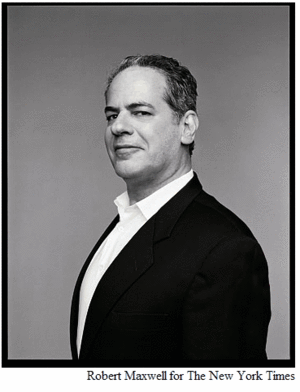 Herbert Muschamp, best known as the architecture critic for the New York Times, died late Tuesday night after a fierce and unpleasant battle with cancer. He was 59
Herbert Muschamp, best known as the architecture critic for the New York Times, died late Tuesday night after a fierce and unpleasant battle with cancer. He was 59
“We were the children of white flight, the first generation to grow up in postwar American suburbs. By the time the ’60s rolled around, many of us, the gay ones especially, were eager to make a U-turn and fly back the other way. Whether or not the city was obsolete, we couldn’t imagine our personal futures in any other form. The street and the skyline signified to us what the lawn and the highway signified to our parents: a place to breathe free.” Herbert Muschamp
"A city is never more fully human than when expertise — our own or someone else’s — allows us access to ebullience, lightness and delight." Muschamp’s review of Santiago Calatrava’s design for a building at 80 South Street, written in 2004
Philadelphia born, Muschamp studied art at the University of Pennsylvania before dropping out to move to New York. He was enmeshed in the burgeoning arts scene and, according to Elaine Woo’s obit in the LA Times, was a regular fixture around Andy Warhol’s "the Factory." Muschamp went back to school, studying architecture at Parsons where he eventually taught. He wrote for Vogue, Art Forum, the New Republic and of course The New York Times where he was architecture critic starting in the early 1980s.
His writing ranged across many fields. His first book File under Architecture, is a, sadly out of print, classic. He wrote Hearts of the City, and the introduction to Robert Mapplethorpe’s The Complete Flowers. In his Man About Town : Frank Lloyd Wright in New York City, Muschamp deflated Wright’s "city hating" posturing as a conceit and looked critically (and at times favorably) at Wright’s urban projects — like Broadacres and Million person skyscraper. It makes for great writing. In an essay on the Viennese architect Adolf Loos in Visions of Utopia, Muschamp wrote a great working philosophy for one’s individual work:
"…utopianism, for me, has come to represent the concept of taking local, idealistic actions in an imperfect universe. I can’t think about this subject in any other way. The conventional utopia–the imaginary ideal city or world — seems to me a transitional state between belief in an almighty dignity, a supreme being capable of bending the laws of nature, and the acceptance of personal responsibility in whatever sphere life happens to place us." Herbert Muschamp "Service Not Included" Visions of Utopia
I loved his writing. It was incisive, funny, and educational. I appreciated his passion (a word that keeps coming up in all the obits about him). You could tell that architecture and the way that people live in the city mattered. 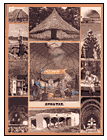 A few years ago I came across a great piece of Muschamp’s 1970s-era criticism in an old volume of Lloyd Kahn’s Shelter book (recently reprinted). The book, sort of a relic of hippie DIY building (it was recently reissued), was a wonder. But I was amazed to see Muschamp in its pages. I remember doing a sort of double take. Of course this was years before his New York Times days, but as I read the piece, titled "Medieval NYC" I realized Muschamp was a perfect fit for this book about building authentically. I found it just as fitting and fresh for the current era. I always found his work to be about a deep humanism and a desire for authenticity. He championed then largely unknown architects like Frank Gehry.
A few years ago I came across a great piece of Muschamp’s 1970s-era criticism in an old volume of Lloyd Kahn’s Shelter book (recently reprinted). The book, sort of a relic of hippie DIY building (it was recently reissued), was a wonder. But I was amazed to see Muschamp in its pages. I remember doing a sort of double take. Of course this was years before his New York Times days, but as I read the piece, titled "Medieval NYC" I realized Muschamp was a perfect fit for this book about building authentically. I found it just as fitting and fresh for the current era. I always found his work to be about a deep humanism and a desire for authenticity. He championed then largely unknown architects like Frank Gehry.
The obituary in the Los Angeles Times quotes Muschamp’s once writing about his agenda:
"If I have an agenda," he wrote, "it is to peek beneath the mantles of authority with which architecture needlessly cloaks itself, and reveal the fishtails and horses’ behinds."
Shouldn’t this be the agenda of every curious living person?
This was published on my blog Wondermachine.
Larry Craig is So Not Gay
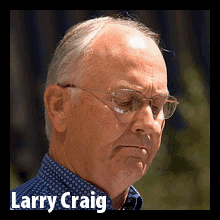 "I am not Gay."
"I am not Gay."
"I never have been Gay," Sen. Larry Craig
Today’s statement from Senator Larry Craig that he is "not Gay" is yet another reminder of how our current use of language isn’t helpful.
Craig claimed he is not Gay after pleading guilt and paying over $1500 in fines in connection with a charge of lewd conduct in an airport restroom in Minneapolis. The story [See the AP video below if you’ve been out of the loop] has been all over the media the last few days with perhaps the best prize for freudian slip going to Craig’s spokesperson who claimed that the whole incident was just a case of "he said/he said." Comedy writers couldn’t make this stuff up. And why, O why, is Jon Stewart off this week of all weeks?!
Now, Larry Craig, is a right-winger. He’s signed on to every bit of malicious anti-Gay legislation he could get his hands on. With the exception of his, apparently open views on immigration (for which he’s received a pummeling from the nativist fringe-nuts in the Republican right wing) he’s a total wing-nut. You mention the "gays" to him and he starts hollerin’ about the evilness etcetera, etcetera. Rumors about his sexuality have been swirling around DC for a while (thanks to the good folks at Blog Active).
Sons of Cohn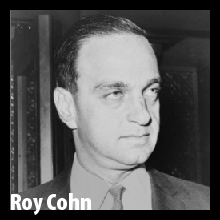 But hearing Craig claim he was "not Gay" puts us to mind of the late Roy Cohn, lackey of Senator Joe McCarthy’s anti-communist witchhunts and general destroyer of lives. Cohn was an evil piece of work on par with J. Edgar Hoover, who terrorized the country and destroyed many lives.
But hearing Craig claim he was "not Gay" puts us to mind of the late Roy Cohn, lackey of Senator Joe McCarthy’s anti-communist witchhunts and general destroyer of lives. Cohn was an evil piece of work on par with J. Edgar Hoover, who terrorized the country and destroyed many lives.
What’s this got to do with Craig? Well, Roy Cohn’s homosexuality was a well known secret in Washington but he was always adamant that he wasn’t "one of those." [If you saw Tony Kushner’s excellent "Angels In America" you’ll remember Al Pacino’s scenery chewing tour-de-force depiction of the closet case.] People like Cohn, and many of the other Republican closet cases that have been caught of late, could claim that they weren’t gay because their existence was so far from the experience of gay people.
We can only imagine that the disparity between the self-loathing Cohn and his same-sex-loving peers was even more pronounced in the 1970s as the Gay community rose up post-Stonewall. On the one hand you had people like Harvey Milk who were out and balanced and trying to contribute to the community at large and then you had the basket/closet-cases like Roy Cohn and his ilk. We can only imagine Cohn looked at the rise of gay-consciousness and its call for "Gay is Beautiful" and thought he had nothing to do with that. It was anathema to the life he’d carved out for himself.
And he would’ve been right. Craig seems to be of that ilk too. So when Craig says "I’m not Gay," we believe him.
We take "Gay" to mean (at the very least):
- "with it" in terms of sexuality or trying to come to terms with one’s sexuality
- honest in the face of one’s truth
- honest to one’s self and one’s family
- loving of oneself
- self-respecting
Granted, these definitions may be somewhat arbitrary. But they make more sense than the popular media and blogosphere’s misapplication of the term "Gay" when using the term "homosexual" would be much more useful in differentiating between people who are honest and work to be whole and productive in the face of a cultural climate of Gay hatred (personified by people like Craig and right-wing fundamentalists) and people who are so far away from getting a clue to what really makes them tick and what would make them happy and whole.
Think about it: what has Larry Craig ever done to DESERVE the term Gay? He seems like the saddest of individuals. He seems like a sorry mass of self-loathing and delusion. In that state, we can feel pity for him and his pathetic lack of courage. We can feel pity because we were there once and we know how hard it is to try to be true to ones self in the face of the culture’s hatred of Gay people. [We can pity him, but we don’t have to excuse his self-hating actions that make the lives of his Gay constituents miserable. His self-loathing doesn’t excuse his anti-Gay actions.]
But when it comes to terms we think Craig is right. We think Larry Craig is, at best, a homosexual or a bisexual. But Gay? Nope. No way. Maybe some day — if he musters the courage to be honest with himself and the world.
Till then he’s nothing but a closeted homosexual who’s not ready for the prime time of a life worth truly worth living.
Regie Cabico on HBO
The ever stunning Regie Cabico on Def Poetry Jam…
He’s announced as being from Williamsburg but Cabico now lives in Washington, DC. A great poem. A lot of fun and moving too.
Remembering John Wallowitch
So yesterday came word, via the New York Times, that John Wallowitch died. Now, unless you were in any way connected to the small universe of New York Cabaret and the supper clubs of the last fifty years you’re probably wondering "Who is John Wallowitch?" He was an amazing composer and performer my partner Pete and I had the chance to catch while in New York back in 2004. Here’s a slightly modified retelling of the story from my blog entry back then:
We got back at about 11 pm and I was pretty tired. And after the long crosstown cab-ride I was seriously in need of a restroom and dashed into the lobby facilities. Pete waited outside for me where he spied a line of gray haired sophisticates waiting to get into Opia, the small bar on the main floor. It being so late in the evening, it peaked Pete’s curiousity. The doors opened and they went in and then a group of hip 20somethings (in their best retro-1970s clothes) got in line and they too entered.
The postcard read Wallowitch Uncensored: "an evening of filth and romance." It ended up being the highlight of what was already a pretty amazing trip.
Wallowitch was an amazing songwriter and cabaret singer. His show was stunning mix of songs by little known composers. I can’t remember a show that elicited so much laughter. He sang in small sets. There was one set celebrating the "emigrant experience." These were three songs by Irving Berlin, "Tokyo Blues," "Back in Italy," and "Cohen owes me 97 dollars" the last one a song I could easily hear Groucho Marx singing. He then added a tune about the Irish called, "Is Your Mother Drunk in Ireland this Evening?" We were on the floor by then and he’d barely started. Other highlights included a few double entendre tunes in a set he titled, "Naughty Tunes for Nice People, or Nice Tunes for Naughty People." These were: "It was hard when I kissed her goodbye," a song about a female athlete titled, "She ain’t much of a wrestler but you ought to see her box" and a wedding song called, "The Best Part of the Wedding is the Swelling of the Organ and the Coming of the Bride." These were all by a composer called Joe Davis. There was also a tune he described as being about filial affection and transportation titled, "I Went to See Jack Off at the Train." It was an amazing show and I recommend all my friends in New York catch it. I figure Wallowich is in his 70s so its one of those "catch him while you can" kinds of things. But he is a wonder. Looking online I found a review by Stephen Holden from the New York Times who wrote,
"While Noel Coward is no longer around to set the standards for a certain kind of sophisticated songwriting sensibility, Mr. Wallowitch nimbly carries the torch."
We spoke with him after the show to introduce ourselves as out-of-towners (Pete was clearly Jack Lemmon). He was extremely gracious and gave us his email and asked us to stay in touch. A few days later I wrote him an email of thanks and he wrote back at 12:05am:
Dan and Peter –
Promise me we will stay in almost constant touch. I certainly cannot afford to lose you two. I just got in from a performance down at the Red Lion in the Village. I wanted to answer your note before I retired to let you know I really appreciate hearing from you. More later. Wallowitch
We tried catching his show again whenever we were in New York but it never worked. The only time he happened to be performing an engagement was last Fall and he cancelled the run. We didn’t know why at the time, but according to the obituary in the paper, he’d been suffering from cancer.
 I wish I could recommend a few of his songs to you but all of his CDs are out of print. I picked up some good used copies on ebay and you might try Amazon. Just search under "Wallowitch." His entry on Wikipedia is mostly my doing as I remember starting the page a few years ago when there wasn’t one up for him.
I wish I could recommend a few of his songs to you but all of his CDs are out of print. I picked up some good used copies on ebay and you might try Amazon. Just search under "Wallowitch." His entry on Wikipedia is mostly my doing as I remember starting the page a few years ago when there wasn’t one up for him.
Rest in peace Wallowitch.
Stephen Holden’s obituary of Wallowitch on the New York Times
(including a really sweet picture of Wallowitch with his partner Bertram Ross)
Playbill’s really good obituary of Wallowitch
